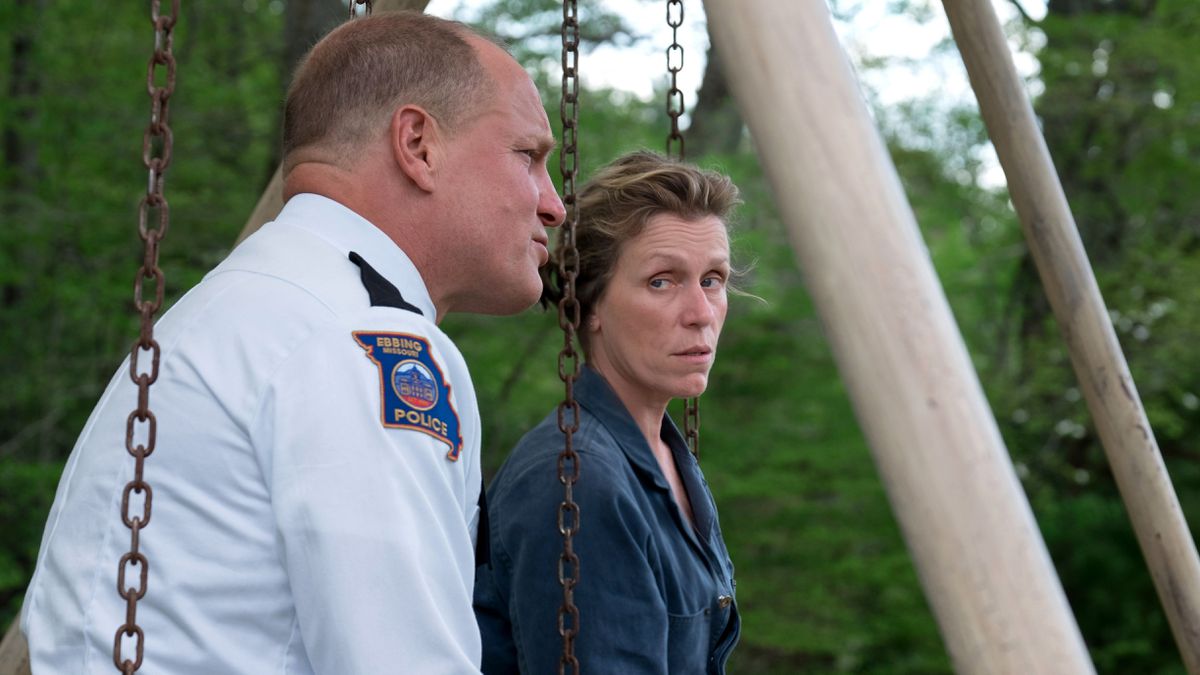This review is coverage for the Twin Cities Film Fest.
Martin McDonagh is a hell of a playwright, and his excursions into film don’t leave one wanting for emotional complexity and humanist characters. In Bruges and Seven Psychopaths are examples of theatrical prose expertly brought to life on screen, with monologues and character-driven dialogue galore, and McDonagh’s latest, Three Billboards Outside Ebbing, Missouri, continues that tradition to great effect, demonstrating the narrative skill of one of the most gifted writers of stage and screen working today. However, for all its technical greatness, Three Billboards left this writer feeling a little cold, for while the component parts of this film beg for it to be considered a masterpiece, the thematic underpinnings of the tale leave something to be desired.
As the title implies, the impetus for the tale is a set of three billboards on a road outside a small country town. Mildred (Frances McDormand) is the mother of a teenage girl who was raped and murdered along that stretch of road a half-year prior, and she rents the billboards to accuse the local police, namely Chief Willoughby (Woody Harrelson), of slacking off on the job. However, what starts as an act of indignant frustration quickly becomes a dispute that consumes the entire community of Ebbing, with people begrudgingly taking sides against a grieving mother in order to preserve their perception of a police force doing their job.
What Three Billboards is exemplary at demonstrating is a complex interweaving of personalities feeding into a system of internalized corruption that pollutes a small community presumably full of good people. McDormand is an absolute powerhouse of a lead, as Mildred carrys the weight of the injustice of her daughter’s death with a mix of guilt, remorse, regret, anger, and retribution that causes her to lash out even as she contains a façade of control. But the way she no longer fits into the willfully ignorant daily lives of the local townspeople is a real eye-opener, for while she has unrealistic expectations as to the local police’s ability to find her daughter’s killer, she isn’t wrong about the corruption at the heart of the police station.
It’s the portrayal of that corruption, however, that keeps the film from reaching great thematic heights. For as eloquent as the dialogue is and as gripping as the performances are—and make no mistake, those elements are superbly executed under the guiding hand of McDonagh’s direction—there’s a bit too much eagerness to paint every character in shades of gray, even when their actions and attitudes don’t deserve it. You see this most prevalently in Chief Willoughby and in Officer Dixon (Sam Rockwell), the former of which is tolerant of the bigoted attitudes of his officers most extremely personified by the latter. Willoughby is portrayed as a sympathetic character in how he works with the flawed human tools at his disposal, but this in turn forgives him for the abuses of power he allows under his command. Dixon is at first seen as entirely unsympathetic, given his racist attitudes and his bumbling drunkenness on the job, but the film bends over backwards to allow Dixon his own chance at redemption, even though nothing he has done up to that point warrants forgiveness. Yes, the narrative is thematically rich in terms of its complex portrayal of these troubling men, but their complexity feels forced when compared to the McDormand’s natural portrayal of Mildred’s growth and the subtle interconnectedness of the surrounding townspeople.
Even with that annoying quirk, though, one shouldn’t mistake Three Billboards Outside Ebbing, Missouri for anything but a great film. It will absolutely deserve its place in the coming award season for McDonagh’s screenplay and McDormand’s performance; seriously, see this film for Frances McDormand alone and you won’t be disappointed. However, it’s a film that comes together as less than the sum of its component parts, as it loses luster the more one dwells upon it. Not every character deserves sympathy and redemption, and unfortunately Three Billboards is a bit too eager to hand out both.













